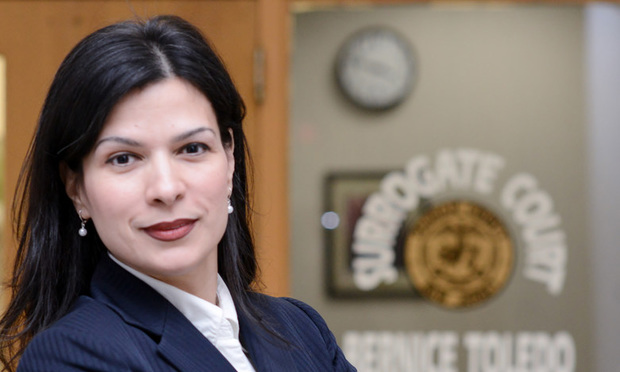Passaic Surrogate Charged With Failure to Recuse From Case Involving Facebook Friend
Passaic County Surrogate Bernice Toledo exchanged six calls from her personal cellphone and 63 text messages with a man in a case she was overseeing despite telling the Advisory Committee on Judicial Conduct that he was "not somebody I'd call to talk to on the phone," according to a complaint that was made public Thursday.
January 02, 2020 at 06:18 PM
5 minute read
 Passaic County Surrogate Court Judge Bernice Toledo.
Passaic County Surrogate Court Judge Bernice Toledo.
The state judiciary's Advisory Committee on Judicial Conduct has accused Passaic County Surrogate Bernice Toledo of a half-dozen violations of the Code of Judicial Conduct for ruling in favor of a personal friend in a disputed estate case.
Toledo disregarded the wishes of a dead man's family members when she picked Keith Stewart to administer the $600,000 estate of Mark Halchak, according the ACJC complaint, which was made public Thursday. After Halchak died intestate in January 2017, his family members and heirs indicated they wanted his cousin, Estelle Halchak, to be administrator of his estate. But Toledo instead picked Stewart, who was not related to Halchak but had been his co-worker.
Toledo announced at the outset of a June 6, 2017, hearing on the appointment that she knew Stewart, but she failed to disclose the full extent of the relationship, the complaint said. Toledo did not mention that she had known Stewart and his family for three decades, that they grew up in the same neighborhood, socialized at parties together and that she was Facebook friends with Stewart, his mother and sister, the ACJC said. In addition, Toledo failed to disclose that Stewart helped with her campaign for surrogate and attended fundraising efforts for her election campaign.
When the ACJC asked about her connection to Stewart, Toledo responded that he was "not somebody I'd call to talk to on the phone," the complaint said. But in the six months before the hearing, she made at least six calls to Stewart from her personal cellphone and exchanged approximately 63 text messages with him, the ACJC complaint said.
Estelle Halchak retained an attorney, Robert Altshuler, to represent her in connection with her application to administer her cousin's estate. Altshuler did not attend the June 6, 2017, hearing, because he did not want to bill his client for the time and because he believed she, as the only family member seeking the appointment, would be named the estate's administrator.
After hearing testimony from Halchak and Stewart, Toledo appointed Stewart to administer the estate. Halchak appealed the appointment in Passaic County Superior Court. In October 2017, Superior Court Judge Thomas LaConte ordered Stewart discharged as administrator and named Halchak and a lifelong friend of the decedent as co-administrators.
When questioned by ACJC investigators about her appointment of Stewart, Toledo "lacked candor and misrepresented the nature and extent of her relationship" with him, the complaint states.
The ACJC says Toledo violated the Code of Judicial Conduct multiple times by presiding over a hearing at which her impartiality or the appearance of impartiality might be reasonably questioned by virtue of her relationship with one of the administration applicants, inappropriately used her office to advance the private interests of another by appointing a friend as administrator of an estate rather than a relative of the decedent, and showed a lack of candor by misrepresenting to ACJC investigators the nature of her relationship with Stewart.
She was charged with violating the following statutes of the Code of Judicial Conduct:
- Canon 1, Rule 1.1, which requires judges to observe high standards of conduct so that the integrity and independence of the Judiciary may be preserved;
- Canon 2, Rule 2.1, which requires judges to avoid impropriety and the appearance of impropriety and to act at all times in a manner that promotes public confidence in the integrity and impartiality of the judiciary;
- Canon 2, Rule 2.2, which requires judges to decide cases according to the law and facts and to not permit family, social, political, financial or other relationships or interests to influence their judicial conduct or judgment;
- Canon 2, Rule 2.3(A), which prohibits judges from lending the prestige of the judicial office to advance the personal or economic interests of the judge or others or to allow others to do so;
- Canon 3, Rule 3.17(B)(6), which requires jurists to disqualify themselves in proceedings in which their impartiality or the appearance of their impartiality might reasonable be questioned; and
- Rule 1:12-1 (g), which requires jurists to disqualify themselves in proceedings in which their impartiality or the appearance of their impartiality might reasonable be questioned.
Toledo did not return a reporter's call about the complaint. Her attorney, Adolph Galluccio of Fontanella, Benevento, Galluccio & Smith in Totowa, said he could not discuss the facts of the case but said he was "confident that when the entire matter is aired, the ACJC will conclude [Toledo] did not violate any judicial code of ethics."
Toledo was first elected to the position of surrogate in 2011, and was reelected to a second, five-year term in 2016. She graduated from William Paterson University and Seton Hall University School of Law.
This content has been archived. It is available through our partners, LexisNexis® and Bloomberg Law.
To view this content, please continue to their sites.
Not a Lexis Subscriber?
Subscribe Now
Not a Bloomberg Law Subscriber?
Subscribe Now
NOT FOR REPRINT
© 2025 ALM Global, LLC, All Rights Reserved. Request academic re-use from www.copyright.com. All other uses, submit a request to [email protected]. For more information visit Asset & Logo Licensing.
You Might Like
View All

So Who Won? Congestion Pricing Ruling Leaves Both Sides Claiming Victory, Attorneys Seeking Clarification
4 minute read
A Year of Controversy: NJ Judges Face Disciplinary and Legal Issues With Mixed Results in 2024
4 minute readTrending Stories
- 1Stevens & Lee Names New Delaware Shareholder
- 2U.S. Supreme Court Denies Trump Effort to Halt Sentencing
- 3From CLO to President: Kevin Boon Takes the Helm at Mysten Labs
- 4How Law Schools Fared on California's July 2024 Bar Exam
- 5'Discordant Dots': Why Phila. Zantac Judge Rejected Bid for His Recusal
Who Got The Work
Michael G. Bongiorno, Andrew Scott Dulberg and Elizabeth E. Driscoll from Wilmer Cutler Pickering Hale and Dorr have stepped in to represent Symbotic Inc., an A.I.-enabled technology platform that focuses on increasing supply chain efficiency, and other defendants in a pending shareholder derivative lawsuit. The case, filed Oct. 2 in Massachusetts District Court by the Brown Law Firm on behalf of Stephen Austen, accuses certain officers and directors of misleading investors in regard to Symbotic's potential for margin growth by failing to disclose that the company was not equipped to timely deploy its systems or manage expenses through project delays. The case, assigned to U.S. District Judge Nathaniel M. Gorton, is 1:24-cv-12522, Austen v. Cohen et al.
Who Got The Work
Edmund Polubinski and Marie Killmond of Davis Polk & Wardwell have entered appearances for data platform software development company MongoDB and other defendants in a pending shareholder derivative lawsuit. The action, filed Oct. 7 in New York Southern District Court by the Brown Law Firm, accuses the company's directors and/or officers of falsely expressing confidence in the company’s restructuring of its sales incentive plan and downplaying the severity of decreases in its upfront commitments. The case is 1:24-cv-07594, Roy v. Ittycheria et al.
Who Got The Work
Amy O. Bruchs and Kurt F. Ellison of Michael Best & Friedrich have entered appearances for Epic Systems Corp. in a pending employment discrimination lawsuit. The suit was filed Sept. 7 in Wisconsin Western District Court by Levine Eisberner LLC and Siri & Glimstad on behalf of a project manager who claims that he was wrongfully terminated after applying for a religious exemption to the defendant's COVID-19 vaccine mandate. The case, assigned to U.S. Magistrate Judge Anita Marie Boor, is 3:24-cv-00630, Secker, Nathan v. Epic Systems Corporation.
Who Got The Work
David X. Sullivan, Thomas J. Finn and Gregory A. Hall from McCarter & English have entered appearances for Sunrun Installation Services in a pending civil rights lawsuit. The complaint was filed Sept. 4 in Connecticut District Court by attorney Robert M. Berke on behalf of former employee George Edward Steins, who was arrested and charged with employing an unregistered home improvement salesperson. The complaint alleges that had Sunrun informed the Connecticut Department of Consumer Protection that the plaintiff's employment had ended in 2017 and that he no longer held Sunrun's home improvement contractor license, he would not have been hit with charges, which were dismissed in May 2024. The case, assigned to U.S. District Judge Jeffrey A. Meyer, is 3:24-cv-01423, Steins v. Sunrun, Inc. et al.
Who Got The Work
Greenberg Traurig shareholder Joshua L. Raskin has entered an appearance for boohoo.com UK Ltd. in a pending patent infringement lawsuit. The suit, filed Sept. 3 in Texas Eastern District Court by Rozier Hardt McDonough on behalf of Alto Dynamics, asserts five patents related to an online shopping platform. The case, assigned to U.S. District Judge Rodney Gilstrap, is 2:24-cv-00719, Alto Dynamics, LLC v. boohoo.com UK Limited.
Featured Firms
Law Offices of Gary Martin Hays & Associates, P.C.
(470) 294-1674
Law Offices of Mark E. Salomone
(857) 444-6468
Smith & Hassler
(713) 739-1250







